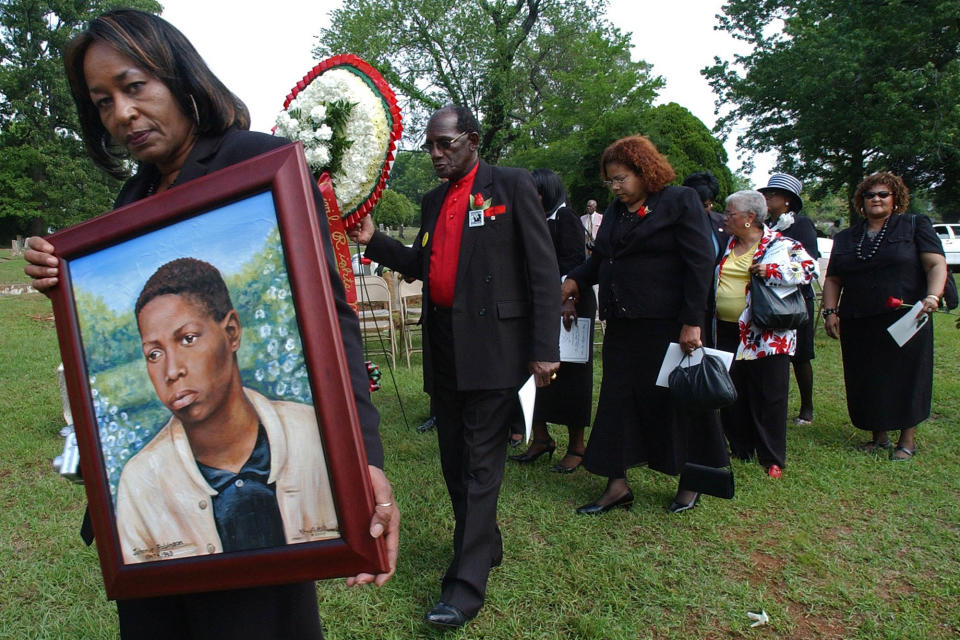The two forgotten Black boys who died the day of the Birmingham church bombing
- Oops!Something went wrong.Please try again later.
Johnny Robinson and Virgil Ware.
Outside of Birmingham, Alabama, those names have gone largely forgotten in the decades since Robinson and Ware died on Sept. 15, 1963, the day four Black girls were killed in the 16th Street Baptist Church bombing.
They died in the erupting chaos after the Ku Klux Klan bombed the church that morning in an attack that killed 14-year-olds Addie Mae Collins, Cynthia Wesley and Carol Robertson and 11-year-old Denise McNair. In the uprising that followed, a white police officer killed Robinson and a white teenager killed Ware.
“For so long, the four little girls got all the recognition, and they forgot about the two little boys,” James Ware, Virgil’s older brother, told The Birmingham News in 2013.
Aside from the four girls, Robinson, 16, and Ware, 13, were the only two people to die in the aftermath of the attack that day. Robinson was with his friends when a group of white people drove by waving Confederate flags, throwing garbage and hurling racist slurs at the Black group, according to NPR. Witnesses said then that a police car arrived after Robinson and his friends were seen throwing rocks at a car draped in a Confederate flag.
“The crowd was running away and Mr. Robinson had his back [turned] as he was running away,” FBI agent Dana Gillis told NPR in 2010. “And the shot hit him in the back.”
Gillis, now retired from the FBI, told NBC News via email that he was tasked with delivering a letter to the Robinson family in 2010 with more information about Robinson’s case and what actually happened that day. Consumed by grief, the Robinsons didn’t talk much about the teen’s death, especially after local and federal grand juries decided not to prosecute Jack Parker, the officer who killed him, NPR reported. Parker died in 1977.
For more from NBC BLK, sign up for our weekly newsletter.
Gillis met with the family as part of an FBI civil rights program to resolve civil rights-era cold cases. Revealing information about Robinson’s death was supposed to give the family closure, The Birmingham News reported in 2013.
“We didn’t get no closure,” Robinson’s sister, Diane Robinson Samuels, said then. “We ain’t got nothing but heartaches.”
Unlike Robinson, Ware didn’t know about the church bombing that day as he rode on the handlebars of his brother James’ bike. Ware and his brothers had picked up a paper route and, to prepare for the gig, visited a scrapyard to find a bike for Ware, Time reported. On the way home, a group of white boys spotted them, apparently mistaking them for other Black boys accused of throwing a brick at a white teen.

According to Time, one of the white boys, Michael Farley, handed a revolver to his friend Larry Sims and told him to fire a shot to “scare” the Black boys. Sims, who told Time in 2003 that he thought he was shooting at the ground, closed his eyes and fired. He shot Ware in the chest and the face.
Sims was convicted of second-degree manslaughter, and Farley pleaded guilty to the same charge. A judge suspended their sentences and gave them two years of probation.
DeJuana Thompson, the president of the Birmingham Civil Rights Institute, told NBC News in an interview that the history is well known in the city and that it’s people elsewhere across the country who don’t know about the boys. An exhibit at the Birmingham Civil Rights Institute features their stories.
“While the bombing happened that morning, their deaths that afternoon were the residual effects of the terror. Those individuals who exacted that terror upon Virgil and Johnny, they were emboldened by what happened that day,” Thompson said.
Before they attacked Ware, Farley and Sims attended a segregationist rally, and Sims has since held that he was simply following his friends and never intended to hurt Ware.
“People don’t understand the ripple effects that these acts of terror have on our community. It didn’t just stop with the church. It didn’t just stop with the four girls and the fifth girl,” Thompson continued, referring to Sarah Collins Rudolph, who was with the four others but survived the attack. “There were impacts felt throughout different parts of the city, and those stories are important to tell, as well.”
The decades after Robinson’s and Ware’s deaths were full of grief for the families — grief over both the loss of loved ones and the seeming invisibility of their stories. For decades, Ware’s remains lay in an unmarked grave in a forest on the side of an Alabama road. In 2004, his remains were reinterred in a new, well-tended, marked grave, USA Today reported then. Ware’s brother Melvin told the newspaper then that he was happy to see such recognition for his brother.
“All these years, he was sitting in the back, in the shadow of the four little girls,” he said. “Now, he’s right alongside them. He was in the shadows, and now they’ve brought him into the light.”
The recognition has continued. In 2011, the boys were inducted into Birgmingham’s Gallery of Distinguished Citizens. Plaques bearing their images now sit alongside those of the four girls in the bombing. Two years later, the city unveiled a sculpture honoring the four girls and highlighting the boys in Kelly Ingram Park. The memorial sculpture, called Four Spirits, features bronze statues of four girls and a bronze bench featuring the names and photos of all six Black children killed that day, including Robinson and Ware.
This article was originally published on NBCNews.com

